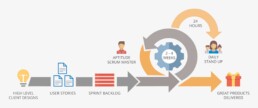Our Development Process and Methodology
The success of any software company is dependent on having the best architectural design for future scalability and on implementing robust QA processes to minimize technical debt.
Aptitude has developed an Application and Infrastructure Foundational Framework to help early- stage software companies build high-performance, scalable applications more quickly and affordably to reduce both time and cost to market as well as minimizing long-term business risk.

Accelerated Time to Market
Aptitude’s Foundational Framework includes built-in security capabilities as well as the infrastructure for build, deployment and server instance management – critical parts of an application that can take significant time requiring senior staff with experience in architecting applications and infrastructures.
With these foundations already in place, developers simply need to build the APIs and services containing their business logic on top of the Aptitude framework, saving significant time to market, especially in the earlier stages of application development.
Breaking it down
Better Scalability, Higher Availability
Aptitude’s Foundational Framework provides a microservices-based architecture that breaks down an application into smaller modules with:
Independently scalable and deployable services
Reduced downtime due to fault isolation
Smaller and easier to manage code base
We also recommend the use of Kubernetes to manage containerized services and workloads resulting in scaling-up when needed, and full application availability when changes are being deployed. Aptitude’s Foundational Framework also uses Continuous Integration / Continuous Delivery (CI/CD) to ensure that code changes are built, tested and deployed as soon as possible.

Built-in Data Integration
Data integration is baked into the Aptitude Framework whereby developers can build applications on top of the framework to define data models that share application data to and from third party applications.
Reduced Technical Debt through Better QA Processes
Application lifecycles can often see rapidly developed MVPs grow into production applications without having implemented robust unit and integration testing. The result can be large, monolithic code bases with numerous unchecked issues that lead to constant firefighting.
Aptitude’s Foundational Framework includes an Automation testing framework that runs during the build/deployment cycle. Specific tests are still coded and created by the development and QA teams, but, thanks to the Aptitude Framework, changes introduced will not break the application. Additionally, core services are built taking Unit Testing into consideration. These services serve as patterns for developers on how to include proper testing for new application code. These pre-made testing patterns and the associated best practices ensure minimal technical debt from the start.
Dev-ops Best Practices
Aptitude’s Foundational Framework includes Dev-ops best practices through the usage of:
Continuous Development
Continuous Integration
Continuous Testing (automated unit testing/integration testing)
Continuous Deployment and delivery (Jenkins, Docker, and Kubernetes)
Infrastructure as Code (Docker, Kubernetes, Helm, etc.)
Cloud Platform Agnostic
Each cloud platform – Amazon Web Services (AWS), Azure, and Google Cloud Platform – have their own flavors of managed services for Databases, Message Queues, and even for CD tools like Kubernetes. Aptitude’s Foundational Framework saves significant effort by avoiding the usage of platform-specific versions of those services by deploying the base infrastructure and application on any cloud platform that offers containers.
Open Source Security & Compliance Management
When software companies negotiate exits, transactions can often be derailed, or valuations reduced, when acquirers – and their legal teams – identify open source compliance breaches that can easily happen without detailed, regular oversight of the development team.
Aptitude’s Foundational Framework is also designed to protect long-term financial security and return on investment by building in real-time, automated open source compliance checking and security scanning to ensure only valid and reliable open source libraries can be used.

Ready to hire the best software developers in the Philippines
Tap into a large IT talent pool with strong ties to American-style business and excellent English-language skills.




